|
|
|
Sort Order |
|
|
|
Items / Page
|
|
|
|
|
|
|
| Srl | Item |
| 1 |
ID:
132317
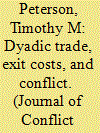

|
|
|
|
|
| Publication |
2014.
|
| Summary/Abstract |
Most studies of the link between dyadic trade and militarized conflict examine the extent of trade interaction. However, interaction measures do not account for the impact of cutting off trade (i.e., exit costs). In this article, I highlight the link between exit costs, the cost of conflict, and "the spoils of conquest," arguing that one state's exit costs are associated with higher incidence of dyadic conflict when its trade partner's exit costs are low. However, its exit costs become less aggravating-and eventually pacifying-as its trade partner's exit costs increase. I test this argument by estimating import demand and export supply elasticities, developing yearly exit cost measures for directed dyads, 1984-2000. Statistical tests confirm that unilaterally high exit costs are aggravating, but that jointly high exit costs are pacifying, a pattern most prominent for trade in strategic commodities.
|
|
|
|
|
|
|
|
|
|
|
|
|
|
|
|
| 2 |
ID:
155189
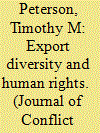

|
|
|
|
|
| Summary/Abstract |
In this article, I synthesize a number of recent studies exploring how exports affect human rights, highlighting a common implication that this relationship is conditional on how exports are associated with leaders’ relative costs of repression and accommodation. Beginning with this synthesis, I develop a theory demonstrating how the composition of exports affects human rights via its impact on leader expectations. More diverse exports promote continued growth and prosperity, provide leaders with greater resources, and suggest conditions less conducive to severe dissent, all of which reduce the relative costs of accommodation. Repression is likely to threaten the benefits otherwise associated with greater export diversity; thus its relative cost increases amid greater export diversity. I test this theory using commodity-level data from the United Nations Comtrade database to create a country-year-level measure of export diversity. Statistical analyses spanning 1981 to 2009 support my expectation. My results are robust to sample restrictions and the use of instrumental variables.
|
|
|
|
|
|
|
|
|
|
|
|
|
|
|
|
| 3 |
ID:
173137
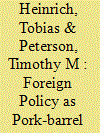

|
|
|
|
|
| Summary/Abstract |
Foreign policy often creates geographically concentrated domestic benefits. A prominent example is the tying of development aid to purchases from the donor country. This feature of aid highlights the utility in examining foreign policy as an instance of pork-barrel politics. Considering tied aid in terms of legislators’ incentives to provide constituent benefits, we argue that people will support an increase in foreign aid spending more when it would promote local economic activity, while opposing aid cuts more when reduced local economic output would result. Crucially, we also expect that people will support their state’s US senator more when informed that the senator attempted to secure (or retain) locally beneficial funds. We find support for our expectations in a novel survey experiment of US citizens. Our results suggest that legislators’ electoral incentives, and consequential local spending, can help explain the adoption of foreign policies despite national-level public disapproval.
|
|
|
|
|
|
|
|
|
|
|
|
|
|
|
|
| 4 |
ID:
139410
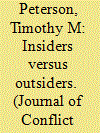

|
|
|
|
|
| Summary/Abstract |
A growing literature examines the link between preferential trade agreements (PTAs) and peace among member states. However, despite the potentially competitive nature of these agreements, there has been little research examining whether and how PTAs could induce hostilities between members and nonmembers. In this article, I argue that dyadic conflict is more likely when one dyad member’s exclusive PTA with a third party results in lower exports for the dyad member that is excluded from the agreement. Importantly, I contend that trade creating as well as trade diverting PTAs can have this effect. I use a triadic extension of the gravity model of trade to estimate how an exclusive PTA influences the exports of nonmembers relative to PTA members. Using these estimates in statistical tests of dyadic militarized interstate dispute onset spanning 1961 to 2000, I find that PTA-induced trade distortions are associated with a higher likelihood of conflict between members and nonmembers.
|
|
|
|
|
|
|
|
|
|
|
|
|
|
|
|
| 5 |
ID:
136618
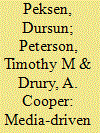

|
|
|
|
|
| Summary/Abstract |
Despite significant research on the role that media coverage of human suffering has on foreign policymaking, no study to date has examined the news media's impact on the use of economic sanctions, a widely used policy tool to address humanitarian problems. This study explores whether news media coverage of human rights abuses in Newsweek and the New York Times increases the likelihood of US economic sanctions. Synthesizing insights from agenda-setting theory with recent work on the domestic origins of sanction policy, we argue that press attention to human rights violations increases the threat and imposition of sanctions by mobilizing the public to pressure leaders to take action against abusive regimes. We find support for this argument in statistical tests of US sanction cases between the 1976 and 2000 period. The results also indicate that the media's effect is conditioned by US strategic ties to potential targets: the effect of critical press coverage is stronger for US non-allies than allies. Further, this conditional effect occurs even though abusive allies receive more media attention than abusive non-allies. Overall, this manuscript shows that nonstate actors can have an important role on foreign policy decision making generally, and specifically that news media influence the US decision to use economic sanctions. Our analyses also suggest that leaders balance the public's demand for action with the security imperative to maintain good relations with allies.
|
|
|
|
|
|
|
|
|
|
|
|
|
|
|
|
| 6 |
ID:
165438
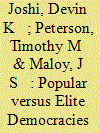

|
|
|
|
|
| Summary/Abstract |
Scholarly research generally finds that democratic governments are more likely to respect human rights than other types of regimes. Different human rights practices among long-standing and affluent democracies therefore present a puzzle. Drawing from democratic theory and comparative institutional studies, we argue more inclusive or “popular” democracies should enforce human rights better than more exclusive or “elite” democracies, even in the face of security threats from armed conflict. Instead of relying on the Freedom House or Polity indexes to distinguish levels of democracy, we adopt a more focused approach to measuring structures of inclusion, the Institutional Democracy Index (IDI), which captures meaningful differences in how electoral and other institutions channel popular influence over policy-making. Analyzing levels of physical integrity rights through a time-series cross-sectional research design of forty-nine established democracies, supplemented by structured case comparisons, reveals a significant and robust relationship between more inclusive democratic institutions and better respect for human rights.
|
|
|
|
|
|
|
|
|
|
|
|
|
|
|
|
| 7 |
ID:
153916
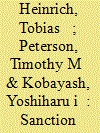

|
|
|
|
|
| Summary/Abstract |
Recent research disputes the conventional wisdom that “sanctions do not work.” It demonstrates that states may impose sanctions for purposes beyond seeking an immediate change in the behavior of targeted regimes. For example, democratic leaders often impose sanctions to satisfy their own domestic constituencies. However, we know little about how the consequences of sanctions shape whether or not citizens favor them. Building on insights from prior studies on the use and consequences of sanctions, we develop theoretical expectations regarding the aspects of sanctions that citizens might favor or disfavor. We use these to design and conduct a survey experiment to explore degrees of support for proposed sanctions. We find that on average, citizens support proposed sanctions that they expect will have a long-run impact on the behavior of the targeted state.
|
|
|
|
|
|
|
|
|
|
|
|
|
|
|
|
| 8 |
ID:
107924


|
|
|
|
|
| Publication |
2011.
|
| Summary/Abstract |
While economic sanctions are commonly regarded as nonviolent coercive diplomacy, scholars show that senders-particularly democratic senders-are actually more likely to use military force against the targets of their sanctions. In this article, the authors extend this connection between sanctions and military action by arguing that countries targeted with third-party economic coercion are more likely to be targets of dyadic militarized violence from states not involved in the sanctions. The act of sanctioning, the authors argue, lowers the prohibitions to use violence against the sanctioned state by others. Empirical analysis of dyadic data from 1914 to 2000 shows that, within directed dyads, militarized interstate dispute (MID) initiation is more likely when the potential target of conflict is sanctioned by third-party states, particularly when the sanctioning state is a large democracy.
|
|
|
|
|
|
|
|
|
|
|
|
|
|
|
|
| 9 |
ID:
181866
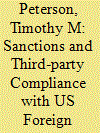

|
|
|
|
|
| Summary/Abstract |
Ostensibly bilateral US foreign policy actions, such as sanctions, can influence third-party compliance with US policy preferences. US sanctions simultaneously signal US preferences and demonstrate leverage, which can motivate third parties to avoid or change proscribed behavior proactively. Empirical testing of this strategic behavior typically is difficult given that it predicts non-events in a noisy signaling environment. However, I argue that the global trade of dual-use commodities—those with both civilian and military purposes—is a phenomenon where we can observe this process systematically. I isolate US sanctions that provide relevant context both by stigmatizing the target and signaling that third-party dual-use exports to the target would directly undermine US policy goals. Using newly-coded bilateral data spanning the post-Cold War period, I find evidence that relevant US sanctions are associated with lower third-party dual-use exports to US-sanctioned states. My findings have implications for scholars and policy-makers, suggesting a broad yet shrouded ability of sanctions to advance US foreign policy goals.
|
|
|
|
|
|
|
|
|
|
|
|
|
|
|
|
| 10 |
ID:
126491
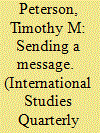

|
|
|
|
|
| Publication |
2013.
|
| Summary/Abstract |
Studies often assume that empty sanction threats inflict reputation costs on senders. However, target response to senders' previous decisions whether to back down or impose sanctions remains unexamined. In this paper, I argue that the target of sanction threats looks to the sender's actions against prior resistant targets. When the sender has backed down recently, the target, inferring that the sender is prone to making empty threats, is less likely to acquiesce. Conversely, when the sender has recently imposed sanctions against a resistant target, the current target infers that sanction imposition is likely to follow resistance, and therefore, it is more likely to acquiesce, all else equal. In statistical tests of US sanction threats spanning 1971-2000, I find strong evidence that the target is less likely to acquiesce when the United States recently backed down from a sanction threat. I find somewhat weaker evidence that the target is more likely to acquiesce when the United States recently imposed sanctions.
|
|
|
|
|
|
|
|
|
|
|
|
|
|
|
|
| 11 |
ID:
104043
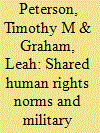

|
|
|
|
|
| Publication |
2011.
|
| Summary/Abstract |
The normative transfer thesis posits that systematic discrimination, inequality, and repression are indicative of violent norms within states, which extend to the realm of foreign policy. In this article, the authors contend that the pacifying influence of similarity conditions the impact of physical integrity norms at the dyad level. Although mutual norms of domestic nonviolence are more pacifying than mutual disregard thereof, the authors argue that a wide disparity in norms is more aggravating than shared violent norms. This follows because similarity of abusive norms may preclude certain conflicts of interest from originating. The authors test this argument on data from 1981 to 2001, finding that conflict initiation is more likely when states have disparate levels of respect for physical integrity rights. The authors find evidence for a conditional norm transfer, as mutually respectful dyads are least likely to experience conflict; however, they also find evidence of a somewhat weaker peace between abusers.
|
|
|
|
|
|
|
|
|
|
|
|
|
|
|
|
| 12 |
ID:
103716
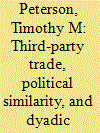

|
|
|
|
|
| Publication |
2011.
|
| Summary/Abstract |
A growing literature maintains that trade is pacifying to interstate relations, and recent work on trade networks suggests that this pacifying effect extends to indirect trade ties. In this article, it is argued that third-party trade can also have an aggravating effect within dyads, by threatening to alter the dyadic balance of capabilities. For the state trading outside the dyad, trade gains from third parties provide incentives to demand change in the dyadic status quo and finance violent conflict when dyadic disputes arise. For the state whose dyadic partner trades with third parties, potential for the trading state to grow increasingly more powerful encourages action to prevent erosion of the non-trading state's relative power. These aggravating effects are conditional, however, on dyadic political similarity, as concerns for relative capability shifts decrease when states do not view their dyadic partners as threats. Hypotheses derived from this argument are tested on data spanning 1885 to 2000. Results support these hypotheses, suggesting important implications for the literature on trade and conflict. When extending the relative gains arguments associated with realism beyond the dyad, a clear, yet conditional, aggravating effect of third-party trade emerges.
|
|
|
|
|
|
|
|
|
|
|
|
|
|
|
|
| 13 |
ID:
120981
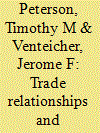

|
|
|
|
|
| Publication |
2013.
|
| Summary/Abstract |
In this paper, we demonstrate that dependence on trade influences asymmetric crisis perception. Unilateral crisis perception is more likely to persist when the initiator of the crisis does not depend on trade with the target because in this case the target lacks capability to harm the initiator. Conversely, when the initiator is dependent on trade with the target, mutual crisis perception occurs sooner. Additionally, a state is more likely first to perceive a threat from another state-beginning a crisis as a target-when its trade dependence on that state is high. We find support for these expectations in survival time regressions and probit models spanning the period from 1919 to 2001.
|
|
|
|
|
|
|
|
|
|
|
|
|
|
|
|
| 14 |
ID:
152891
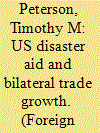

|
|
|
|
|
| Summary/Abstract |
Previous research demonstrates that the decision to issue international disaster aid depends in part on the political relationship between donor and recipient countries. However, the reverse case—the impact of disaster aid on subsequent relationships—remains largely unexamined. In this paper, I argue that disaster aid promotes reconstruction, reduces investors’ risk perception, and improves disaster victims’ perceptions of the donor state. Together, these factors suggest a subsequent increase in trade between donors and disaster victims. I use error correction models (ECMs) to assess the short- and long-term influence of US disaster aid on trade growth over the 1973–2008 period. My results suggest that an increase in disaster aid often leads to a subsequent increase in bilateral trade considerably larger than the initial aid commitment. I also find, controlling for other determinants of disaster aid, that preexisting trade with the United States is not associated with a victim’s likelihood of receiving US aid. My findings are important for policymakers, suggesting the presence of a material incentive to complement humanitarian imperatives to grant disaster assistance.
|
|
|
|
|
|
|
|
|
|
|
|
|
|
|
|
|
|
|
|
|